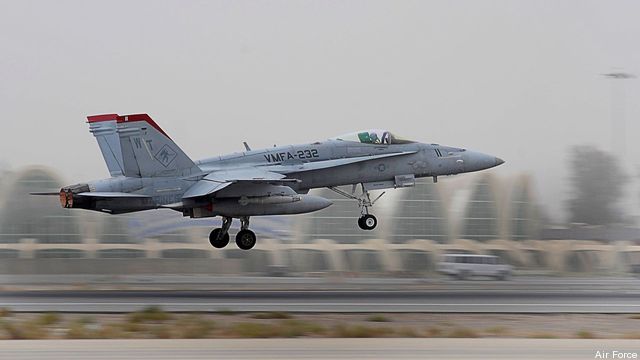Navy: We Never Said We Were Buying More Super Hornets
Posted on

[UPDATED with Navy retraction] So is the Navy buying more Super Hornets or not? A solicitation notice posted on FedBizOps.gov sparked heated media speculation this week that the service might extend production of the current F/A-18E/F Super Hornet as the F-35 Joint Strike Fighter program struggles.
It’s true the US Navy is the least enthusiastic of the three services buying the F-35. It’s also true that Boeing, which makes the Super Hornet, has touted it worldwide as the right-here, right-now alternative to the F-35. And, of course, there are plenty of F-35 critics — including a few in Congress — who’d love the speculation to be right. But if you look closely at the notice — and if you actually ask the Navy about it — you find there’s a lot less there than meets the eye.
[UPDATED: In fact, late Thursday, the Navy withdrew what it is now calling a “presolicitation” altogether. “The posting was the result of pre-decisional and internal budget discussions and was posted erroneously,” said Vice Adm. David Dunaway, chief of Naval Air Systems Command, in a Friday night statement. “We took immediate actions and retracted the solicitation.”
Given that the notice originally went up October 17 and wasn’t retracted until the 31st, that “immediate” is a little dubious, but the Navy is definitely nailing the coffin shut on speculation. For our reasoning why the speculation was wrong to begin with, read on. ]
Start with the first line of the solicitation itself: “The Naval Air Systems Command intends to solicit and negotiate a Fixed Price Incentive Firm, sole source contract with the Boeing Company, for the procurement of up to 36 FY15 (Lot 39) F/A-18 E/F and EA-18G aircraft. ”
Note three crucial phrases:
The first is “up to 36,” which could mean “zero.”
The second is “FY15,” i.e. fiscal year 2015, for which the President’s budget hasn’t even been finalized yet, let alone submitted to a gridlocked Congress.
The third is “and EA-18G aircraft,” the Navy electronic warfare jet known as the Growler. The EA-18G is derived from the F/A-18E/F design, as its numerical designation implies, but its electronics and its mission are very different: It’s a replacement for the geriatric EA-6B Prowler radar-jamming plane, not a fighter aircraft. So even if the Navy did decide to buy more than zero aircraft and actually got the 2015 funding to do so, it might buy Growlers, not Super Hornets.
So I asked the Navy to clarify what this really meant. Naval Air Systems Command released the solicitation to lay the procedural groundwork for “a potential option for any prospective requirements that may emerge in fiscal 2015, USN or FMS,” said NAVAIR spokesperson Marcia Hart. “[But] currently, there is no fiscal 2015 or subsequent requirements for additional F/A-18E/Fs or EA-18Gs…..We were just ensuring that if a decision is made to add more aircraft in the fiscal 2015 budget, we would have the proper acquisition process in place to facilitate.” (Italics mine).
Note the words “no…requirements.” In the Pentagon, “requirement” is a term of art, implying a formalized assessment process has produced a written document that says, in essence, “we plan to buy this.” It’s perfectly possible for a requirement never to lead to an actual procurement. But without a requirement, a procurement can’t proceed, and there’s no requirement here. (The Pentagon can buy whatever it wants during a war if the need is urgent. That exception has been used to rush into service such things as body armor and roadside bomb detection for Afghanistan and Iraq, not for Navy jets).
Note also those three little letters, “FMS.” That stands for “Foreign Military Sales“: export contracts in which the Defense Department acts as an intermediary between the US arms maker and a foreign client. In other words, if the Navy ever makes use of this “potential option,” it might well be on behalf of a friendly nation, not for itself.
It is possible that the Navy might buy more Super Hornets in 2015, and this solicitation keeps that door open, just in case. But that is extremely unlikely to happen.
Updated 1:00 pm Monday with Navy statement on retracting the solicitation.
Subscribe to our newsletter
Promotions, new products and sales. Directly to your inbox.
